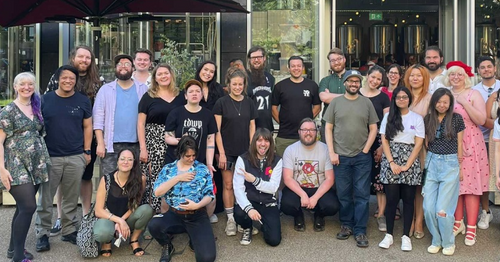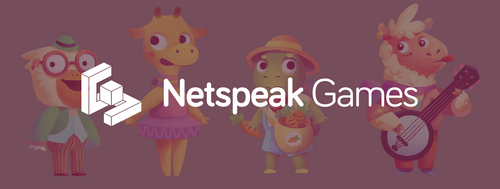Inclusive Management at Netspeak Games
Katharine Barnett

Today, our Production Director Katharine Barnett talks about her experience of Netspeak’s management culture, and why an inclusive environment helps enable her work.
Why?
Netspeak is a totally remote company of 50 or so little legends right now. At the end of the day, our audience are also a diverse group of people and we need to make a game that’s representative of our players, so that means including people in the development of the game who represent our players. There are tons of studies on why it’s better to have different voices contributing to your work. Having many different points of view in collaboration makes sure nothing gets overlooked. It prevents groupthink and promotes better teamwork, leading to new and innovative ideas. Listening to the same voices agreeing with each other hinders progress. We’re trying to make something that’s new and innovative, and we’re never going to manage that if we’re just listening to the same old voices all agreeing with one another.
But this comes with its own challenges. We’re all complex people, with different backgrounds, perspectives, and mental health needs. Supporting peoples’ needs and doing it well remotely needs careful consideration.
Inclusive Management
Personally, I know for a fact that I’m better at my job because I'm surrounded by more different types of people. Last year I remember working on a feature with a group that happened to all be women - I was doing the production, and there was a woman writing the code and a woman doing the art - and I remember realizing that I've never had this in another company, ever. To contrast that, I’ve had experiences in the past where I’ve been in companies with nine or ten directors, and other than me they were all blokes, and that can feel awful. When you’re the only person in the room who’s not a bloke and you raise an issue, you’re often spoken over or sidelined, and especially when you try to have conversations about diversity in those environments people often don’t take it well because they don’t empathize with my situation. And I’ve never felt that way at Netspeak, because all the teams including the management teams have a good mix of people in them. It means I feel able to say what I really think, and I know I can expect to not be spoken over.
The Monkey Brain moment
So, having lots of different people is vital, but you also have to acknowledge that different backgrounds and personal circumstances also means people come with different communication styles and experiences. Sometimes messages can get misunderstood or lost in translation, particularly when most of your communication is via text, where tone of voice can be hard to interpret! Little misunderstandings can lead to frustration, which can lead to people feeling excluded or checked-out. That’s a reality and you need to develop tools to handle it.
A simple thing we do at Netspeak to try and address that particular hazard is the Monkey Brain. When you’re feeling a bit overwhelmed or wound up, it’s perfectly fine to say “I’m having a bit of a 🐒 brain moment, I’m upset about this and need a minute to get a better response to you” or “Ahhh a 🐒 🧠 moment, this is difficult, I don’t know how to react to this!” And it’s a little bit silly but it also signals to the person you’re talking to that they need to slow down and help you get the context you need.
It’s a simple thing really, just a civil way of acknowledging your emotions and making those moments of friction easier to manage. And I really like it! It’s something we get taught in our management training, and something which gets used on a daily basis. It shows that on an organizational level, the team is really thinking deeply about how to build tools and techniques to help people work better and how to manage things that can happen when work gets difficult, in a way that ultimately helps everyone to have a voice.
Takeaways
The advice I’d give to someone who’s trying to build a better management culture is that you have to be deliberate about it. Things will inevitably default to the status quo unless you actively take steps to include people. And it has to be something which extends into the leadership team at your company, because the behavior in that group sets the tone for how everyone else acts. You need to build explicit tools and values and establish them in your company handbook, and your documents, and your pillars and values. Do that stuff early, and get it in there from the beginning.

